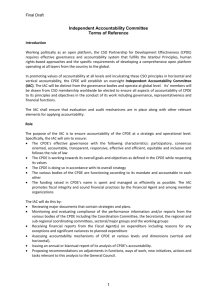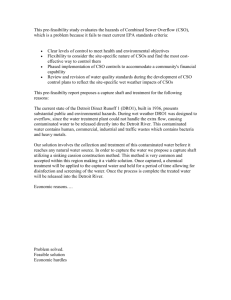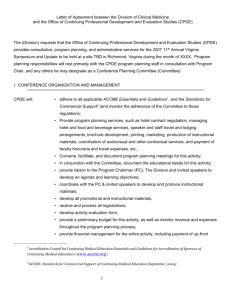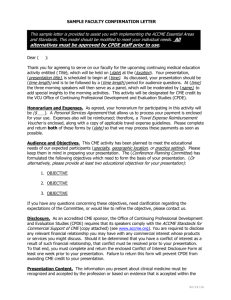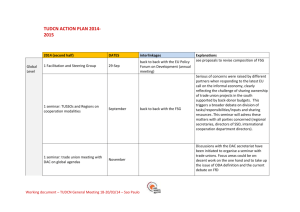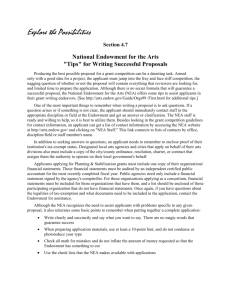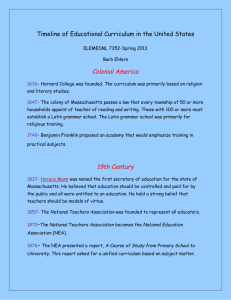North East Asia Sub-Regional Meeting Report
advertisement
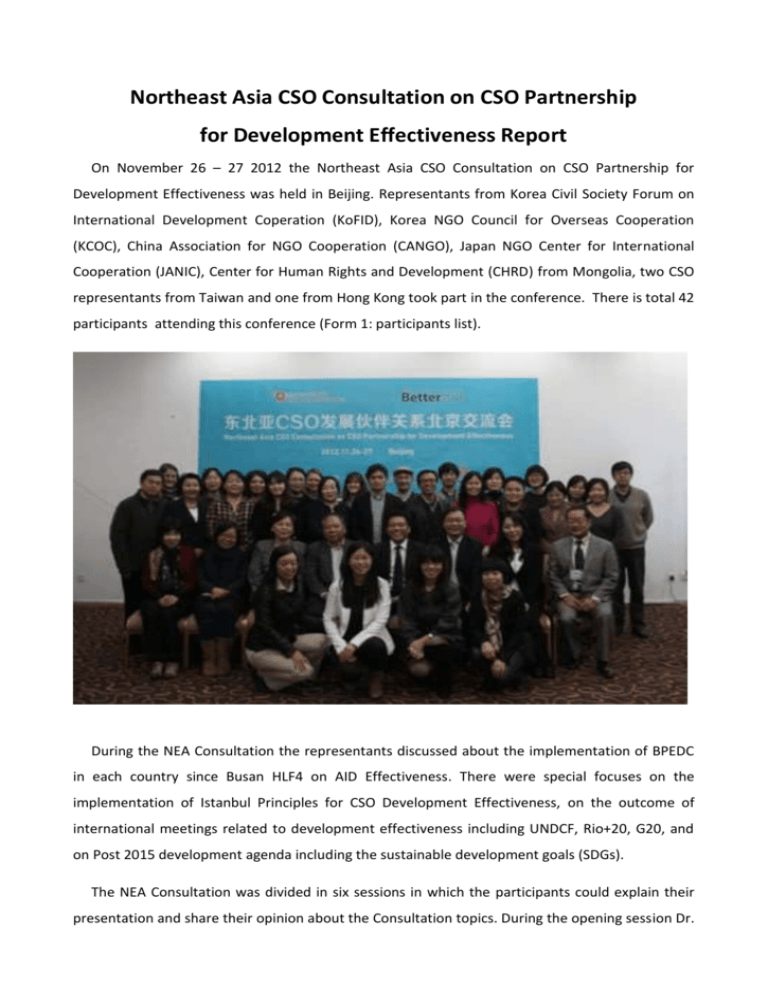
Northeast Asia CSO Consultation on CSO Partnership for Development Effectiveness Report On November 26 – 27 2012 the Northeast Asia CSO Consultation on CSO Partnership for Development Effectiveness was held in Beijing. Representants from Korea Civil Society Forum on International Development Coperation (KoFID), Korea NGO Council for Overseas Cooperation (KCOC), China Association for NGO Cooperation (CANGO), Japan NGO Center for International Cooperation (JANIC), Center for Human Rights and Development (CHRD) from Mongolia, two CSO representants from Taiwan and one from Hong Kong took part in the conference. There is total 42 participants attending this conference (Form 1: participants list). During the NEA Consultation the representants discussed about the implementation of BPEDC in each country since Busan HLF4 on AID Effectiveness. There were special focuses on the implementation of Istanbul Principles for CSO Development Effectiveness, on the outcome of international meetings related to development effectiveness including UNDCF, Rio+20, G20, and on Post 2015 development agenda including the sustainable development goals (SDGs). The NEA Consultation was divided in six sessions in which the participants could explain their presentation and share their opinion about the Consultation topics. During the opening session Dr. Zhao Daxing, CANGO deputy executive director, gave a speech to welcome the guests to the NEA Consultation. Then Dr. Xiao Fenghuai, CANGO vice-chair, introduced himself and Dr. Lee Anselmo, presented the agenda and the program of the NEA Consultation (Form 2: meeting agenda). To conclude the opening session Dr. Shi Zhongcheng from CANGO gave a speech about the historical role of China in cooperation with Asian and African countries. During the first session Dr. Lee, on behalf of KoFID/KCOC, introduced the agenda and the program of CPDE NEA. Dr. Lee clearly explained the CPDE background and context, gaving more information about HLF4 and GPEDC, CSOs in Post Busan Process, and Asian CSOs responses. He briefly explicated the 10 GPEDC Indicators and the Key elements on CSOs at BPEDC. About the Post Busan process Dr. Lee illustrated the global processes and the Asian responses and finally specified which decisions should be taken in Beijing. After this introduction, representants from each country were divided in groups and they discussed in national language about the development of CSO in their country. They talked about the problems that every country has and how to build a CSO network to help each other to develop CSOs. The second session was focused on the update on CPDE sectoral and thematic issues. Dr. Lee Anselmo from KoFID, Dr. Zhao Daxing from CANGO, Dr. Gombosuren Urantsooj, chairperson of Center for Human Rights and Development from Mongolia and Dr. Cho Young Sook from Korea Women’s association United (KWAU) shared their experience in their country about different topics. Dr. Zhao shared his opinion about the MDG and how to reach these goals. He talked about some successful experience reached from China, like poverty reduction and he explained the role of CANGO to reach this goal. In the same speech Dr. Zhao asked what should be done for the next MDG, which strategies should be used and what each country can do to reach these goals. The speech of Dr. Gombosuren was focused on CPDE Human Rights-Based Approach (HRBA). She argued about the different concepts of Human Rigths in different countries and the strategic objectives to get equality and no exclusion in the society. After that, Dr. Cho Young Sook from KWAU took the floor and introduced the women’s rights organization and network consultation on CSO partnership for development effectiveness held on July 25 – 26 2012. She started to expound the background and context of the consultation meeting and then she mentioned the main obejectives of the consultation that were to contribute to the shaping of the Global CSO Partnership Strategy and Engagement on Development Effectiveness framework, to share the impact of the work, to develop a work plan to engage the new policy context, among others. Then Dr. Cho clearly explained the reflection and recommendations on the Busan process, followed by proposed inputs into the CPDE document. The second section of the Consultation was concluded with the group discussion in national language. During the third section, the last of the first day of the Consultation, representants of each country reported the topic of their discussion in the group. After the discussion, every country get respective conclusion. Chinese group claims that they focus on NGO capability building, and raise Chinese NGOs’ participative level; Korean group maintains that we should strengthen diverse countries or areas’ discussion toward equal election CPDE paper, allocation of responsibilities in CPDE, some principles of democratic management in CPDE, and encourage to deepen global visual angle; Mongolian group displays their CSO visual angle, they pay more attention on fund recourses. Japanese group suggests to increase CPDE’ s transparency, and set supervision mechanism, set regional leader etc. The second day of the consultation started from the fourth session in which representants of each country updated and shared the national actions and processes on implementation of BPEDC and Istanbul Principles for CSO Development Effectiveness. The first country that shared its experience was China. Dr. Xu Xiaoxiao project associate in CANGO introduced China Effective Development Network (CEDN). CEDN was initiated by Cango and established in 2009. It is a leading platform to promote CSOs development and to improve aid effectiveness in China. During the presentation Dr. Xu explicated the CEDN agenda and achievements. She introduced the CEDN website created in 2011 where it is possible to get information about the development of the platform. To conclude, Dr. Xu explained the CEDN outlook for the next five years which are to promote participation of CSOs in more regions in the development of aid effectiveness and development effectiveness, and to design programs and activities for CSO capacity building and sustainable development. After Dr. Xu, Dr. Wang Xiangyi, project manager of environment protection project in CANGO gave a speech about the eviromental NGOs developments in China. She explained that the main idea is to create a relationship between the three main sectors which are the government, enterprises, and civil society. After a reminder of the major Chinese NGO development between 1992 Rio Summit and 2012, she explained the different existing organizational types in China, giving there registration status and examples. It showed that the number of registered organizations increased from 2007 to 2010. Some additional statistics of environmental NGOs in China showed that there were 1116 Environmental Student Associations in China in 2005 and that about one third of environmental NGOs have no professional employees. The presentation then pointed out the fact that the influence NGOs have come from awareness and information, not money nor power. Their influence is still limited to this day. Dr. Wang, then illustrated the main challenges for environmental NGOs in China and the challenges encountered by international cooperation with Chinese NGOs. Finally, she mentioned the changes brought with the 18th National Congress of the CPC, such as the fact that it now provides more opportunities for NGOs to establish partnerships with the government and the private sector. The report reaffirms “ecological civilization”. After China followed the Japanese presentation. Dr. Ohashi Masaaki, from Japan NGO Center for International Cooperation, explained actions and process to put BPEDC and Istanbul Principles in practice. A brief introduction was given on Major Network NGOs in Japan. Then the main events that happened before and after the HLF were exposed, followed by the major challenges in the Japanese context, which are untying aid, transparency, and a framework for dialogue. Dr. Ohashi showed how CSOs have been trying to put the Istanbul Principles into Practice and analyzed the unfamiliar principles for Japanese NGO highlighting the challenges and the on going efforts to tackle the challenges. The third country to give a presentation was South Korea. Dr. Minn Kyoung Il from One – Body One – Spirit (OBOS) Movement. He claims his organization comply with several principles: human rights and social equality, promoting environment sustainable development etc, and introduce some working methods. To conclude the fourth session, Dr. Gombosuren Urantsooj from Mongolia presented Mongolia update on BPDC and Istanbul principles for CSO Development Effectiveness. She started the presentation giving updates on previous actions, then she introduced the ongoing projects about Istanbul Principles and enabling environment for CSO, and ongoing actions on CPDE. To continue Dr. Gombosuren made a comment concerning the management of foreign aid. She said that an Office of Foreign aid policy and cooperation was created in 2010, and the Foreign aid Coordination council was set up. Among the possible reforms are two laws to be included in foreign aid: a law on management and financing of budget organizations and a law on budget. Some data were given on foreign grants, for which the main donor has been Japan from 1991 to 2010. Dr. Gombosuren mentioned the audit report conclusions which showed that the office of foreign aid can not provide enough information on donor agencies, aid projects, and does not conduct monitoring and evaluation of aid projects. She concluded with the main challenges and suggested that some actions need to be taken regarding those issues, and among them: building a better enabling environment for CSOs, access to information, democratic ownership, and advocating reforms. The fifth session focused on the elections and decisions on sub – regional Coordination Mechanism. The participants were involved in the election of NEA sub regional focal person, to decide on the NEA sub regional focal person. The last session of the consultation was dedicated to the Action plan, where all the participants were involved in establishing a collective action planning at the NEA Sub-region and a working calendar. After the conference, the session of visiting Beijing Local NGO is also added. The name of this NGO is Hongdandan Education and Culture Exchange Center, which is a grass NGO in China, focusing on help blind person understand our word through audio introducation, their main production audio explanation movie. Though this experience, foreign participants understand Hongdandan, The further purpose of this visiting is making foreign NGO participants understand Chinese grass NGO deeply, and realize how these grass NGOs raise fund and manage. Northeast Asia CSO Consultation on CSO Partnership for Development Effectiveness (CPDE NEA Consultation) 26-27 November 2012 Beijing, China Country/Ar Surname Given Name Organization Ohashi Masaaki Japan NGO Center for International ea Cooperation Janpan Nakashima Takahiro Nagoya NGO Center Kawamura Akio Kansai NGO Council Horiuchi Aoi Japan NGO Center for International Cooperation Sugimoto Kanako Japan NGO Center for International Cooperation Lodoisambu Dugarmaa u Mongolia director of Health and Environment Centre Namssrai Bayarsaikhan chairperson of Step without Border Gombosuren Urantulkhuur director of Food Coalition Gombosuren Urantsooj chairperson of Centre for Human Rights and Development Chuluunbaat Burmaa ar Gotov Youth group leader of the Coalition "All 4 Education" Oyuntuya director Consumer Foundation Philippine Danlog Ava IBON International MINN KYOUNG IL One-Body One-Sprit (OBOS) Movement, KoFID Korea JUN JEE EUN KoFID / KCOC KIM HEE KYUNG Save the Children Korea, KoFID LEE MI HYEON People's Solidarity for Participatory Democracy (PSPD), KoFID NAM SANG EUN World Vision Korea / KoFID CHO YOUNG SOOK NEA Gender Focal Point, Korea Women's Association United(KWAU), KoFID LEE Seong-hoon NEA Focal Point, KoFID / KCOC Carnay Ur Norman Asia Pacific Mission for Migrants Chinese Hung Chih-Chieh Zhi-Shan Foundation Taiwan Wang King-Ying Noordhoff Craniofacial Foundation XIAO Fenghuai CANGO ZHAO Daxing CANGO SHI Zhongcheng CANGO Chinese ZHANG Yuanfeng Southwest science and Law University mainland BIANBA Chinese Hongkong Tibet Association for NGO Cooperation WANG Man G-CAP GENG Hua G-CAP FU Tao Chinese Development Brief LIAO Guochao Jiangxi province Mountain, River and Lake Sustainable development Association MA Tiannan Xiamen Green Cross WANG Xiangyi CANGO XU Xiaoxiao CANGO XU Shanshan CANGO ZHENG Hong CANGO LOU Han CANGO Northeast Asia CSO Consultation on CSO Partnership for Development Effectiveness (CPDE NEA Consultation) 26-27 November 2012 Beijing, China Program Agenda and Schedule Final version (24 Nov. 2012) Day 0 (Sunday, 25 November 2012) Arrival 17:0018:00 18:0020:00 Preparatory meeting among 4 national focal points / CPDE Focal Points (Asia, NEA, Gender) at the Hotel Informal reception / dinner (optional) Day 1 (Monday, 26 November 2012) 08:3009:00 Registration Opening Session 09:0009:45 Moderator Welcome remarks —— XIAO Fenghuai, CANGO Vice-Chair Presentation and Adoption of agenda and program by Anselmo Lee, CPDE NEA Focal Point Introduction of participants Special Presentation “Chinese NGO's Status and Effect on Foreign Aid"—— SHI Zhongcheng, Senior Adviser, CANGO Session 1 : Update and review of the global processes Moderator: 09:4510:30 Asia Pacific Consultation on CPDE (Hanoi, 8-9 June, 2012) and followup processes (other sub-regional meetings) GPEDC process since the OECD WP-EFF (Paris, 28-29 June, 2012) including the Steering Committee of GPEDC (London, 5-6 Dec. 2012) by Anselmo Lee, CPDE NEA Focal Point. CPDE Assembly (Nairobi, 8-9 Dec. 2012) Recommendation and report of the Selection Committee for the CPDE Financial Agency/Secretariat 10:3011:00 Break and group photo 11.0012:00 Group discussion by country in national language 12.0013:30 Lunch Session 2: Update on CPDE sectoral / thematic Issues 13:3015:00 Moderator CPDE Paper (final version), Ava Danlog, CPDE Asia Focal Point Advocacy Strategy on Post MDG and Sustainable Development (draft) CPDE HRBA Working Group Strategy (draft), Anselmo Lee, CPDE NEA Focal Point Paper on Gender Strategy, Youngsook CHO, CPDE NEA Gender Focal Point Break 15:0015:30 15:3016:30 Group discussion by country in national language 16:3018:00 Session 3: Reporting and Synthesis 18:3021:00 Welcome dinner Day 2 (Tuesday, 27 November 2012) Session 4: Update and sharing of national actions and process – on implementation of BPEDC and Istanbul Principles for CSO Development Effectiveness (Art. 22) 09:0010:30 Moderator China: 1. Introduction of CSO Development Effectiveness Network, Xiaoxiao XU, Project Manager of CSO Effectiveness Development Project 2. Environmental NGOs Development in China, Xiangyi WANG, Project Manager of Environment Protection Project Japan Ohashi Massaki, JANIC 10:3011:00 South Korea, Kyungil MINN, OBOS Movement, KoFID Mongolia Break Session 5: Elections and Decisions on Sub-regional Coordination Mechanisms 11:0011:30 Moderator Appointment / confirmation of country focal persons and sectoral focal points Election of NEA sub-regional focal person Decision on the NEA sub-regional secretariat and steering committee Session 6 : Action Planning 11:3012:30 Moderator Anselmo Lee, NEA Focal Point Country and/or sectoral/thematic action plan Collective action planning at the NEA Sub-region Working Calendar 12:3013:00 13:0014:00 14:0015:00 15:00 - Closing Session Lunch Group discussion by country in national language (optional) Beijing Local NGO visiting

